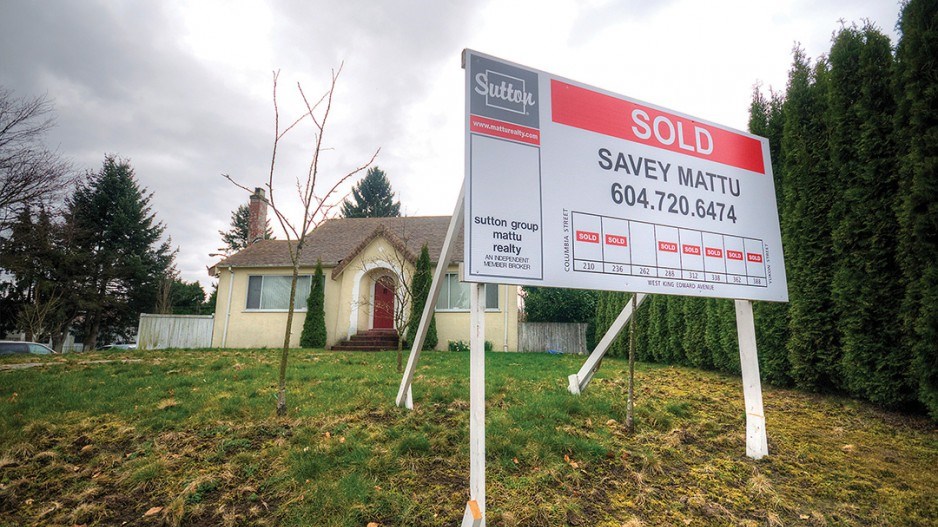Part 1 of a two-part series
The stunning rebound in B.C. real estate sales that followed the 2008 financial crisis was hailed as a sign of resilience in the face of global uncertainty. Seven years later, booming markets have become a liability for Premier Christy Clark as businesses find themselves squeezed by rising property taxes, industrial land is disappearing and anyone earning a local income knows the math on a simple home purchase increasingly doesn’t add up.
A year ago, developers and municipal leaders clamoured for senior levels of government to spearhead planning measures to free up land for development.
The province responded by putting an extra $1 million toward strengthening the Agricultural Land Commission and by moving to reduce the effect of foreign buyers on home prices.
And then, when stories of shadow flipping began making headlines, the province acted, tightening the rules governing the assignment of contracts so that greedy realtors couldn’t profit at the expense of trusting homeowners.
The move exempted presale contracts, however, allowing the assignment of these contracts – a practice that had come under scrutiny in 2008 – to continue. The province explained to Business in Vancouver at the time that developers “generally do not need the same kinds of protections as consumers.” BIV subsequently found that Metro Vancouver developers saw vague enforcement and only modest concern about assignment sales after the new rule took effect May 16.
A year later, shadow flipping, never widespread, has fallen from the headlines. Meanwhile, the assignment of contracts is increasing while the reasons for doing so remain the same.
“We absolutely have seen an increase in assignment requests,” said Ryan Lalonde, co-president of MLA Canada, a project marketing firm in Vancouver. “It’s difficult for me to make a claim that the intentions of these purchasers is outside of what it typically was prior to this policy.”
While purchase activity fell in 2016’s latter half, Lalonde said demand has picked up in the past two months to a point where it’s beyond what he saw a year ago.
With standing inventories at record lows, he said buyers have no option but to consider presales, and when their plans change – as happened to one couple Lalonde knows – they have no problem cashing out.
“The assignment contract is a vehicle for someone to pursue different interests than when they entered into the contract,” he said. “In any marketplace where you have the double-digit gains that the various markets throughout the Lower Mainland have been able to achieve, [when] the terms of these contracts is anywhere from one, three, sometimes four years between purchase and completion, and with the incredible gains that the marketplace has gone through over the past 36 months, it’s easy to understand how the interests of those homebuyers can change.”
Anti-avoidance penalties for speculators mean not all developers allow presales, but Lalonde said that others are “not as conservative.” Cressey Development Corp., for example, maintains the right of owners to assign their contracts.
The key issue for Lalonde is a lack of supply, which he said leaves buyers with few options but presales.
“Would homebuyers have more opportunities to consider the right home as opposed to being forced into a transaction because of limited supply?” he asked. “That’s the real conversation.”
Raising the property transfer tax on August 2 on homes worth $2 million and up as well as on residential purchases by foreign nationals blocked demand and stalled the market, but prices have yet to approach anything first-time buyers would call affordable.
December’s move to offer five-year, payment- and interest-free loans of up to $37,500 to first-time buyers sounded good but was simply a hand-up to market prices. It didn’t bring them within the means of the average household.
Meanwhile, supply constraints continue.
The Urban Development Institute’s (UDI) most recent market report slammed the province, along with municipalities, for their inaction.
“Doing nothing, blaming foreign buyers, or introducing new, punitive taxes have not made housing more plentiful or affordable for home-seekers,” said UDI president and CEO Anne McMullin.
Recent discussions in Richmond and other municipalities regarding limits on the kinds of houses people can build in the Agricultural Land Reserve put further pressure on a tight land supply.
“Fundamentally, we’ve run out of single-family land,” Peeter Wesik, president of Wesgroup Properties, told the UDI in January 2016.
A year later, with an election looming, the BC Liberals have yet to take the decisive action to create more homes for the growing number of people attracted to the province by the economic opportunities promised in the last election.
Affordable housing for civic workers has been a hot topic in Vancouver – long the poster child for high real estate prices in the province and, indeed, Canada – and is becoming one in more communities across the province, from Victoria to Kelowna and beyond, as people seek cheaper housing elsewhere.




